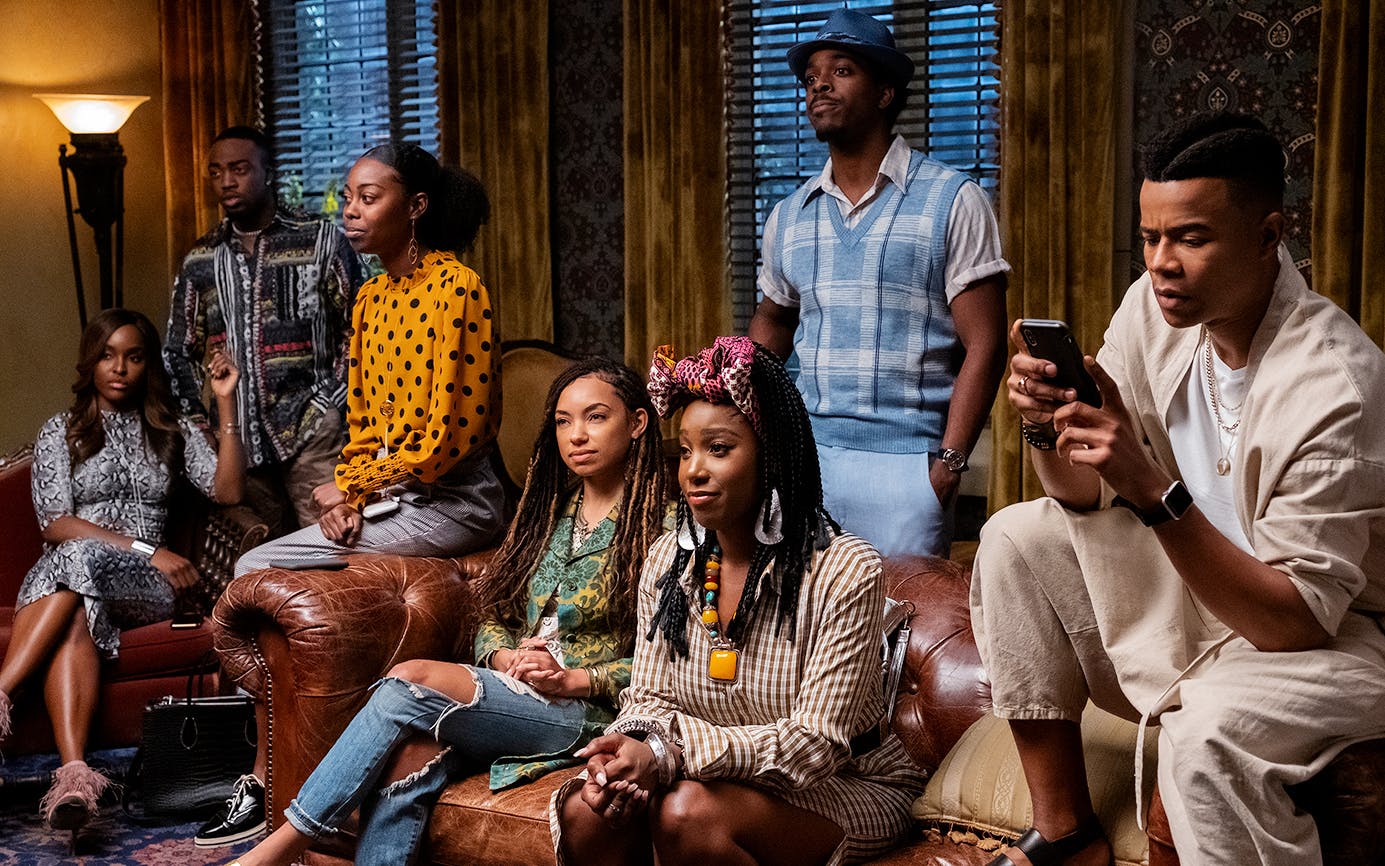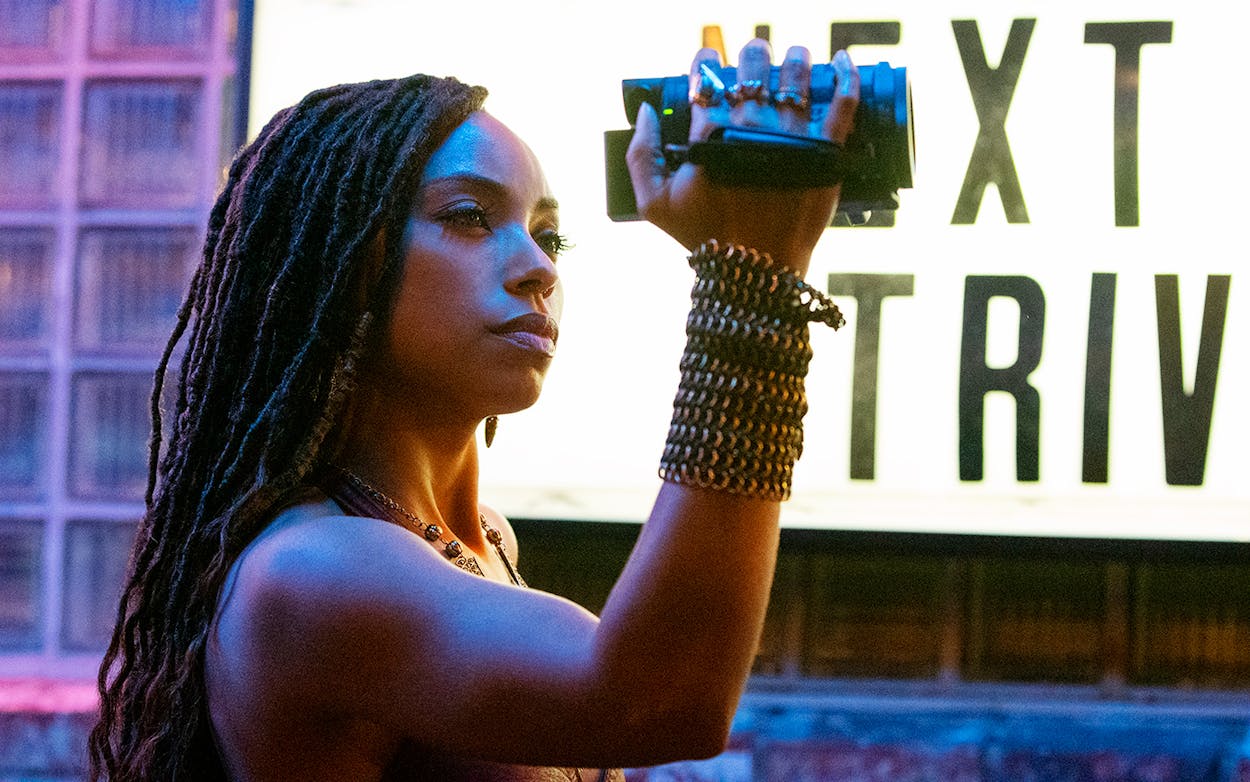Justin Simien’s Dear White People has often felt like it was biting off more than it could chew, even since its earliest incarnation as a movie. In the 2014 film, and subsequent two seasons of the Netflix TV show, Winchester University’s black students have dealt with a blackface party, the integration of the only all-black dorm on campus, and internet trolls—not to mention what they’re each dealing with personally. These incidents alone call for multiple perspectives, because they’re multifaceted issues reflective of never-ending conversations and realities among black people. For a satirical television show to try to fully explore these topics in just ten thirty-minute-long episodes each season is ambitious, and nearly impossible. Still, that doesn’t excuse the directionless wandering of the show’s new third season, released on Friday. (Note: This review contains spoilers.)
In the first episode of this season, we quickly learn that things are different for Winchester’s students, who are perhaps weary of all that’s transpired. As Al (Jemar Michael) wanders around trying to get his formerly politically passionate friends to sign a petition to make Winchester a sanctuary campus, he finds that our favorite rabble-rouser, Sam (Logan Browning), can’t be roused to do much anymore, and the usually prolific student journalist Lionel (DeRon Horton) hasn’t published a single article for the campus newspaper. While Joelle (Ashley Blaine Featherson) has now taken over hosting the radio show “Dear White People” from Sam, even she is “acting so different from the traits [she] previously established,” as a frustrated Al points out to her and Reggie (Marque Richardson) after they sign his petition without even reading it.
His observation also reflects how this season abandons some of the show’s longtime stylistic and thematic focuses. For one thing, the show’s ever-present omniscient narrator has stopped narrating, now stepping into a new role as a character. But this role isn’t as meaningful as we anticipated it being, especially following the huge reveal (at the end of season two) that Giancarlo Esposito had been narrating all along. For most of that season, Lionel and Sam had teamed up to uncover a secret society of black people at Winchester (named The Order), and their investigation led them to the bell tower where they found Esposito. In season three, he then explains that the two students have even more digging ahead to get into The Order, but they decide it’s all too much and walk away—essentially discarding the plot that drove the majority of season two. It’s anticlimactic, to say the least.
Even if the show scrapped the majority of themes and narrative tools that drove it in the past, some things remain the same. Sam is still, in a way, Dear White People‘s primary protagonist: she was our introduction into Winchester with her radio show “Dear White People,” and even as the show has branched out to explore the inner workings of other characters, we still spend the most time with her. This time she’s mostly ditched her campus activist ambitions, and spends the majority of season three attempting to work on a documentary assignment for her junior thesis. With her fire to call out racial injustice dimmed, Sam can’t find a focus for her documentary. Instead, she randomly films clips of flowers, scenes of her classmates, and sporadic interviews with her friends, splicing them together in the hopes that narrative direction will reveal itself.
As her professors, classmates, and friends repeatedly point out, she’s “vamping”—stalling for time while she figures out what her documentary’s about. That’s what Dear White People is doing this season: shiftlessly following characters around as they stray further from the stories they’d previously established.
Attempts to explore previously sidelined characters’ stories also fall flat. For instance, Rashid (Jeremy Tardy), the token African member of the ensemble, spends the majority of his episode pining after the romantically unavailable Joelle and talking with other African students, who reduce ongoing issues of racial discrimination to “constant whining” and criticize Americans for talking to them in a “Coming to America accent” (while the actors themselves speak in stereotypical accents). Brooke (Courtney Sauls) and Kelsey (Nia Jervier) have a brief romantic dalliance; overachieving Coco (Antoinette Robertson) continues to hallucinate visions of her unborn daughter; and Troy (Brandon P. Bell) and his father, the Dean of Winchester, are now suddenly close (at one point randomly flossing—meaning the dance—together in his office). Save for a few clips of Joelle running the “Dear White People” radio show, there’s very little mention of it throughout the season, either. And even when Gabe (John Patrick Amedori) pretends to be Native American to win an academic grant after his Republican parents lose money on a bad investment, Sam can’t even be bothered to pretend to be mad.

Like Sam, Dear White People seems to have backed away from the “movement,” instead bouncing around from scene to scene and character to character, trying to arrive at an eventual focus. But along the way, it does manage to land some good jokes, make a few salient points, and introduce refreshing new characters. D’unte (Griffin Matthews), an older gay student who acts as a big brother to Lionel, is one of them. Another is Jerry Skyler, a visiting director and actor who has a franchise around his character Mr. Griggins, an offensively stereotypical black man from the Antebellum South. To Sam, Skyler is a sellout, and she only reluctantly accepts his mentorship after her documentary hero Cynthia Fray (Laverne Cox) dismisses her as a potential mentee. But after a few verbal sparring sessions, Skyler points out that Sam doesn’t get to dictate where people find their representation. He embodies how creator Justin Simien and Dear White People take thoughtful yet inconclusive approaches to complex issues within black culture. It’s an example of Simien at his best, in part because Simien himself plays Skyler.
That same thoughtfulness is at play with a handful of other story lines. One involves Moses Brown (Blair Underwood), a former Winchester professor who left for a career in Silicon Valley and recently returned to teaching. Brown quickly takes Reggie under his wing, after he realizes that Reggie’s still traumatized after a campus police officer pulled a gun on him at a party. Brown helps pass a policy officially disarming campus police, mentors Reggie on the failures and the opportunities of the tech world, and even gives him the beta version of an app meant to help heal people in the aftermath of traumatic events.
This mentorship causes a noticeable difference in Reggie’s demeanor, which is all the more tragic when it’s revealed that Brown has been sexually inappropriate with a student, Coco’s friend Muffy (Caitlin Carver). The gnarled discourse surrounding sexual misconduct allegations comes through between Reggie and Joelle’s discussions—in them, they hit on many talking points without making them seem like talking points. There’s the history of black men being falsely accused of raping white women, as well as the lack of solidarity that white feminists show black women (to wit: Earlier in the season, Muffy tells Joelle to just “lean in” and not limit herself when dealing with the stereotype of the angry black woman).
Joelle and Reggie’s conversations feel similar to those following #MeToo allegations, and specifically the ones against Bill Cosby and R. Kelly. Reggie’s investment in a man who is very much a hero to him feels real, as does Joelle’s disbelief that Reggie would automatically dismiss Muffy’s experience. As the characters grapple with how to handle Muffy’s allegations, it becomes clear that a more intersectional exploration of racial politics is what the show is gesturing toward. In the scene where Reggie confronts Brown, Brown yells, “There are people who don’t want to see me win, see us win.” Reggie responds that he’s no longer part of Brown’s “us,” and is instead one of the people who doesn’t want to see Brown “win.” It’s a refusal of a pro-black stance that has often come at the expense of women and LGBTQ people.
In the last episode, Sam films another female student talking about another incident with Brown, which suggests that she’s found her focus once again. As she sits and talks with Lionel, Troy approaches them to discuss The Order, the secret society that Sam and Lionel have largely moved on from. It’s a cliffhanger similar to where season two left off. But after a meandering third season, it’s hard to imagine we’ll get any more clarity on the purpose of the society, or of Dear White People, in the show’s next chapter.
- More About:
- Film & TV
- Television








